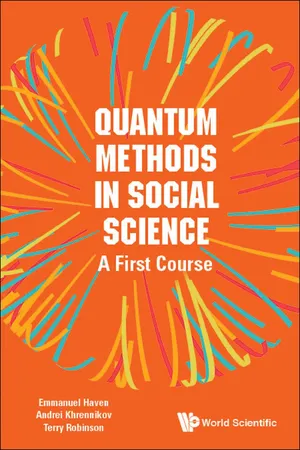
Quantum Methods in Social Science
A First Course
Emmanuel Haven, Andrei Khrennikov;Terry Robinson
- 276 pagine
- English
- ePUB (disponibile sull'app)
- Disponibile su iOS e Android
Quantum Methods in Social Science
A First Course
Emmanuel Haven, Andrei Khrennikov;Terry Robinson
Informazioni sul libro
-->
Shown here is how basic concepts of physics can be used to improve models in finance, economics, psychology and biology. Readers are introduced to how physical theory can inform non-physical phenomena in the social sciences, thereby improving decision making and modeling capabilities in research-based and professional settings.
Consisting of three parts, the first part deals with the application of quantum operator methods to financial transactions and population dynamics. Part two develops physical concepts, working from classical Lagrangian and Hamiltonian mechanics and leading to an introduction of quantum information and its application to decision making. The final part treats classical and quantum probability theory in some detail and deals, at a more advanced level, with the impact of quantum probabilities on common knowledge and common beliefs between agents in systems.
Quantum Methods in Social Science is a high level textbook for advanced undergraduate or graduate students of economics, finance and business, while also being of interest to those with a background in physics.
--> Contents:
- Quantum Counting: The Number Operator in a Social Science Context:
- Introduction
- Classical Interlude: Modelling Population Dynamics
- A Quantum Description of Systems
- Quantum Counting
- Quantum Transactions
- Quantum Migration
- More Elaborate Systems
- Conclusions
- References — Part I
- The Quantum-Like Paradigm with Simple Applications:
- Taking a Step Back
- Modeling Information with an Operational Formalism
- Decision Making and Quantum Probability
- References — Part II
- The Quantum-Like Paradigm with Advanced Applications:
- Basics of Classical Probability
- Quantum Probability
- Common Knowledge
- Quantum(-Like) Formalization of Common Knowledge
- Examples
- Appendix
- References — Part III
-->
--> Readership: Advanced undergraduate or graduate students of economics, finance and business, while also being of interest to those with a background in physics. -->
Keywords:Quantum Formalism;Physical Theory;Hamiltonian Mechanics;Probaility Theory;Financial Modeling;Langrarian Mechanics;Quantum Operator Methods;Population DynamicsReview:0
Domande frequenti
Informazioni
Operator in a Social Science Context
Chapter 1
Introduction
1.1.What’s it all about?
Indice dei contenuti
- Cover
- Halftitle
- Title
- Copyright
- Dedication
- Contents
- Preface
- About the Authors
- Part I Quantum Counting: The Number Operator in a Social Science Context
- Part II The Quantum-Like Paradigm with Simple Applications
- Part III The Quantum-Like Paradigm with Advanced Applications
- Index